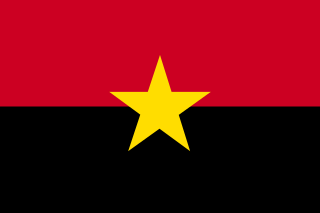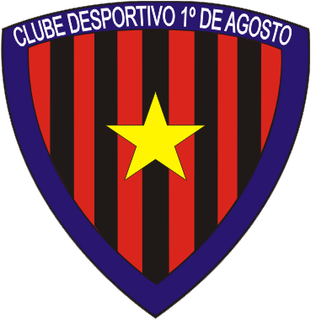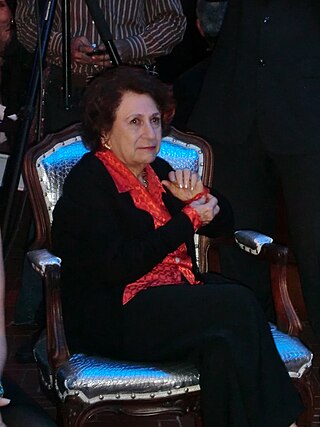
Angola, officially the Republic of Angola, is a country on the west-central coast of Southern Africa. It is the second-largest Lusophone (Portuguese-speaking) country in both total area and population and is the seventh-largest country in Africa. It is bordered by Namibia to the south, the Democratic Republic of the Congo to the north, Zambia to the east, and the Atlantic Ocean to the west. Angola has an exclave province, the province of Cabinda, that borders the Republic of the Congo and the Democratic Republic of the Congo. The capital and most populous city is Luanda.

The People's Movement for the Liberation of Angola, from 1977–1990 called the People's Movement for the Liberation of Angola – Labour Party, is an Angolan social democratic political party. The MPLA fought against the Portuguese Army in the Angolan War of Independence from 1961 to 1974, and defeated the National Union for the Total Independence of Angola (UNITA) and the National Liberation Front of Angola (FNLA) in the Angolan Civil War. The party has ruled Angola since the country's independence from Portugal in 1975, being the de facto government throughout the civil war and continuing to rule afterwards.

The Angola national football team represents Angola in men's international football and is controlled by the Angolan Football Federation. Nicknamed Palancas Negras, the team is a member of both FIFA and the Confederation of African Football (CAF).

Clube Desportivo 1º de Agosto is a multisports club from Luanda, Angola. The club, founded 1 August 1977, is attached to the Angolan armed forces, which is its sponsor. Its main team competes in men's football, and its professional basketball team is also noteworthy within the club. The club's colors are red and black. The club won its first title in football, the Angolan League, in 1979. and in basketball in 1980. Handball and Volleyball have also won many titles to the club.

Girabola, or Campeonato Nacional de Futebol de Séniores Masculinos, is the top division of Angolan football. It is organized by the Angolan Football Federation.
Mateus Galiano da Costa, known simply as Mateus, is an Angolan professional footballer who plays as a winger or a forward for Portuguese club F.C. Maia Lidador.

The National Air Force of Angola or FANA is the air branch of the Armed Forces of Angola.

Margot Benacerraf was a Venezuelan film director. She studied at the Institut des hautes études cinématographiques in Paris and is best known for her 1959 award-winning film Araya.
A cinematheque is an archive of films and film-related objects with an exhibition venue. Similarly to a book library, a cinematheque is responsible for preserving and making available to the public film heritage. Typically, a cinematheque has at least one motion picture theatre, which offers screenings of its collections and other international films.

Glauce Rocha was a Brazilian actress. She appeared in 34 films and television shows between 1950 and 1971. She starred in the film Os Cafajestes, which was entered into the 12th Berlin International Film Festival.
The Arquivo Histórico Nacional is the national archive of Angola. Overseen by the Ministry of Culture, it is headquartered in the city of Luanda on Rua Pedro Felix Machado. As of 2016 a new archives building was under construction in Camama. The Arquivo Histórico Nacional originated in the Centro Nacional de Documentação e Investigação Histórica.
Cinemateca Uruguaya is a non-profit cinematheque in Montevideo, Uruguay, established in 1952, that aims to support the cultural development of cinema, and of art in general. Since its inception, it has belonged to the International Federation of Film Archives (FIAF). It is also a founding member of the Latin American Coordinating Committee of Moving Image Archives (CLAIM), and advisory member of the Audiovisual and Film Institute of Uruguay (ICAU).

The Cinemateca Brasileira is the institution responsible for preserving Brazilian audiovisual production. In July 2021, it experienced a major fire.

Eles Não Usam Black-tie is a 1981 Brazilian drama film directed by Leon Hirszman, based on Gianfrancesco Guarnieri's play of the same name.

The Angolan Men's Basketball League,, for sponsorship reasons known as the Unitel Basket, is the top tier men's basketball league in Angola.

The Angolan Basketball Federation is the governing body of official basketball competitions in Angola. FAB was founded in 1976, with Mr. José Jaime de Castro Guimarães serving as chairman. The federation was first housed at Rua Rainha Ginga and later moved to the current address on the ground floor of an apartment building located in the Cidadela Sports Compound. FAB oversees the activities of the 18 provincial basketball associations in the country. Typically the federation has a 42-member staff, including 3 members of the general assembly, 3 from the audit committee, 5 from the legal board, 5 from the disciplinary board and 16 collaborators while the management is made up of 10 members.
The Angolan Handball Federation is the governing body of official handball competitions in Angola. FAAND was founded on May 20, 1974, still in the heat of the anti-colonial struggle, when a group of nationalists decided to establish the federation. On May 20, every year, the National Handball Day is celebrated, to mark the day that for the first time, a handball tournament was organized in Angola. However, only in 1976 it officially began to operate. Mr. Francisco António de Almeida was appointed as chairman. FAB oversees the activities of the 18 provincial handball associations in the country.
The following is a timeline of the history of the city of Luanda, Angola.

The National Cinematheque of Venezuela is a Venezuelan public institution founded on May 4, 1966, by Margot Benacerraf and since then is dedicated to archiving, preserving and presenting film archives in Venezuela. It holds more than 85,000 films, 30,000 photographs, 420 movie posters, 400 scripts and 30,000 film books and magazines.











